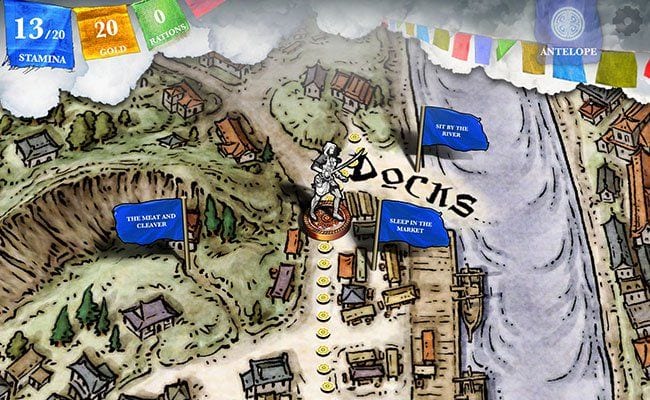
I enjoyed the first Sorcery! game because everything you did felt inconsequential. All the money and magical items and spells were neat, the various people and creatures you met along the way were fascinating, but all were still inconsequential. It was a freeing experience, being able to play in the moment, without any care for future events. If that first game was defined by this kind of narrative freedom, the second game is defined by a restriction of that freedom. Suddenly, consequences matter. Not in a major way, but just enough to focus your play, which is both good and bad.
Sorcery! 2 takes you to the city of Khare, known as the Cityport of Thieves. You’re supposed to traverse the city, from the southern side to the North Gate. The catch: The North Gate is locked, and the combination password to open it is spread across the city.
On the positive side, this forces you to play multiple times, while making different choices each time. The Sorcery! games are at their best when replayed when you can see the various story threads branching out and converging. Like first game, Sorcery! 2 is filled with fascinating little vignettes, and this need to replay the game forces you to seek out those vignettes because they might hold clues to the endgame.
On the negative side, you now have to play with a purpose. You can no longer play purely for drama, you to have to play to make progress. This can be annoying because your fortunes can change in an instant. You’ll be talking to kids in the street one moment, and thrown in jail the next, with many of your supplies and items gone. If you’re playing for progress, those items matter, and losing them is frustrating.
This need for progress also puts a damper on the branching story. When every conversation and every encounter can branch many different ways, we naturally stress about what choice will lead to our preferred outcome. The game allows you to rewind any decision, so if things don’t work out it’s easy to try and try again, but the mere possibility for failure still adds an element of stress. Especially when we’re looking for that one last clue that we can’t seem to find.
Thankfully, having a specific goal doesn’t ruin the game. We don’t have to gather all the clues in a single playthrough, which alleviates some of the stress since we don’t ever have to play “perfectly.” We can get into trouble and fail and skip over entire sections of the city, and as long as we remember our previous games, or as long as we recorded those clues outside of the game, we can still unlock the gate in the end. This takes some of the narrative responsibility off our back and keeps the game, overall, feeling more fun than anxiety-inducing.
I loved the first Sorcery! because it let me explore an interesting world and didn’t punish me for that exploration. Sorcery! 2 is an improved sequel because it builds on the mechanics and narrative of that first game, but in doing so it also leaves behind the simple joy of the first game.

